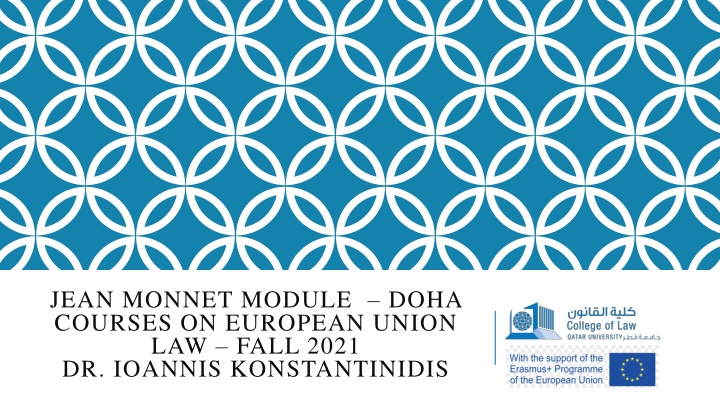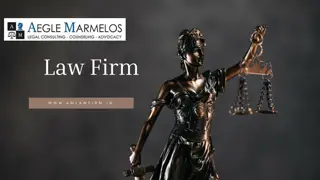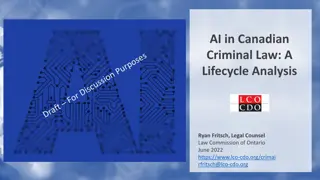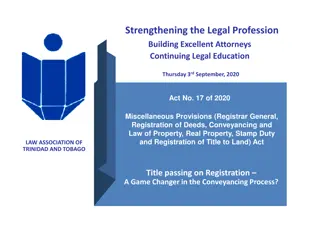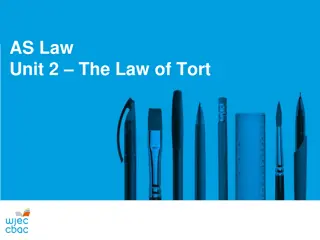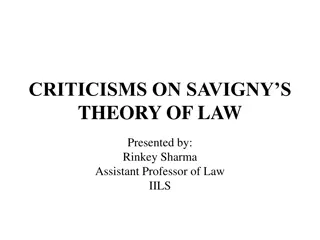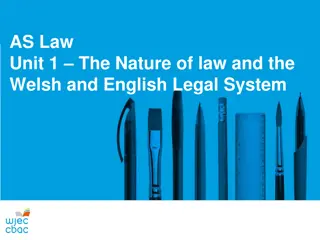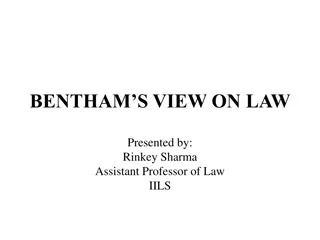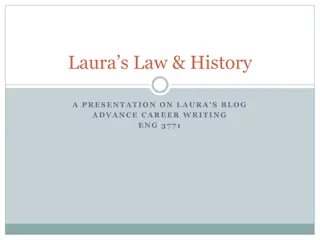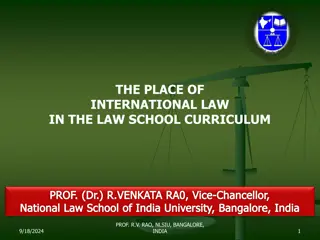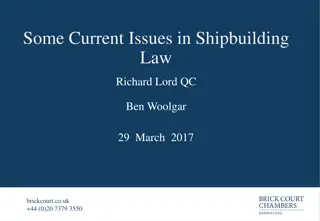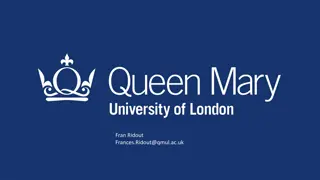LAW
Dive into the historical background and development of European Union law in the field of human rights, tracing its evolution from the early European Economic Communities to the present day. Understand the EU's commitment to human rights and explore the significant milestones that have shaped this important legal framework.
Download Presentation

Please find below an Image/Link to download the presentation.
The content on the website is provided AS IS for your information and personal use only. It may not be sold, licensed, or shared on other websites without obtaining consent from the author.If you encounter any issues during the download, it is possible that the publisher has removed the file from their server.
You are allowed to download the files provided on this website for personal or commercial use, subject to the condition that they are used lawfully. All files are the property of their respective owners.
The content on the website is provided AS IS for your information and personal use only. It may not be sold, licensed, or shared on other websites without obtaining consent from the author.
E N D
Presentation Transcript
JEAN MONNET MODULE DOHA COURSES ON EUROPEAN UNION LAW FALL 2021 DR. IOANNIS KONSTANTINIDIS
WELCOME TO THE COURSE Instructor Dr. Ioannis Konstantinidis, Assistant Professor of International Law, College of Law, Qatar University Ph.D. Sorbonne Law School/Universit Paris 1 Panth on-Sorbonne, France LL.M. Sorbonne Law School/Universit Paris 1 Panth on-Sorbonne, France M.A. Institut d Etudes Politiques de Paris/Sciences Po, France B.A. National and Kapodistrian University of Athens, Greece
WELCOME TO THE COURSE Contact Details Email: ikonstantinidis@qu.edu.qa Office: College of Law Building I09, Office B335 Office Hours (via Blackboard Collaborate): Monday, 11:30AM 12:30 PM
WELCOME TO THE COURSE Course Information Class Days: Sunday/Tuesday/Thursday Class Time: 8:00 PM 9:00 PM Classes will be held online via Blackboard Collaborate
STUDENTS Students What is your background? Why did you choose this course? What are your expectations for this course?
COURSE 2: THE EVOLUTION OF THE EUROPEAN UNION LAW IN THE FIELD OF HUMAN RIGHTS WEEK 4 I. Historical Background and Development of the Case Law II. From the 1977 Declaration to the Treaty of Lisbon III. Concluding Remarks
WEEK 4 Learning Outcomes: On completion of this week, students should Have developed an advanced understanding of the emergence of the European Union's commitment to human rights
I. HISTORICAL BACKGROUND AND DEVELOPMENT OF THE CASE LAW The European Union (EU) and Human Rights
I. HISTORICAL BACKGROUND AND DEVELOPMENT OF THE CASE LAW The Growth of an Idea In spite of Article 2 of the Treaty on the European Union (EU), according to which the EU is founded on the value of respect for human rights, human rights were not a pressing concern in the early European Economic Communities (ECC, 1957) (as it then was)
I. HISTORICAL BACKGROUND AND DEVELOPMENT OF THE CASE LAW The Growth of an Idea Why? The EEC Treaty started out as an economic treaty, of limited ambitions, with the aim of creating a Common Market. There were no sections on fundamental rights because the EEC founders did not think this relevant to a treaty with mainly economic aspirations
I. HISTORICAL BACKGROUND AND DEVELOPMENT OF THE CASE LAW The Growth of an Idea Why? The European Convention on Human Rights and Fundamental Freedoms (ECHR) was also, of course, already in existence, and probably thought sufficient to operate as a Bill of Rights for Europe The ECHR was promoted by the Council of Europe and NOT by the EU
I. HISTORICAL BACKGROUND AND DEVELOPMENT OF THE CASE LAW The Growth of an Idea The fundamental rights gap became all too apparent at a very early stage in the life of the EEC: national courts feared that Member States could use the EEC in order to circumvent the fundamental rights guarantees that had been at the center of the post-war constitutionalizing effort If the EEC had been given regulatory powers which could directly affect individuals, and those powers were not curtailed by fundamental rights, then individuals might see their fundamental rights limited beyond what was permissible under their own constitutional arrangements
I. HISTORICAL BACKGROUND AND DEVELOPMENT OF THE CASE LAW The Growth of an Idea It did not take long for the Court of Justice of the European Union to find that fundamental rights were part of the general principles of Community law which the Court would protect
I. HISTORICAL BACKGROUND AND DEVELOPMENT OF THE CASE LAW The Growth of an Idea In the case of Stauder, Mr. Stauder attacked a European Commission decision which made the distribution of butter at reduced prices conditional upon the identification of the recipient He claimed that having to be identified by name breached his right to dignity as protected by the German Constitution. The German court referred a question to the Court of Justice to assess the validity of the Commission s decision
I. HISTORICAL BACKGROUND AND DEVELOPMENT OF THE CASE LAW The Growth of an Idea Having examined different language versions of the Commission s decision, the Court of Justice found that identification by name was not required by the Community act The Court considered fundamental rights unwritten general principles applicable to the acts of the EEC s institutions
I. HISTORICAL BACKGROUND AND DEVELOPMENT OF THE CASE LAW The Growth of an Idea In subsequent case law the Court clarified that in deciding which fundamental rights formed part of the general principles of the EEC law it would draw inspiration from constitutional traditions common to the Member States and from international treaties for the protection of human rights to which Member States were signatory or had collaborated; of those, the most significant is without doubt the ECHR
II. FROM THE 1977 DECLARATION TO THE TREATY OF LISBON The Response of the Political Institutions It is not surprising then that the developments in the case law of the Court met with the approval of the political institutions
II. FROM THE 1977 DECLARATION TO THE TREATY OF LISBON The Response of the Political Institutions In 1977, just eight years after the ruling in Stauder and once the case law was settled , the European Parliament, the Council, and the Commission issued a joint declaration to the effect that they considered themselves bound by fundamental rights as general principles of (then) EEC law
II. FROM THE 1977 DECLARATION TO THE TREATY OF LISBON The Response of the Political Institutions After that, every Treaty revision strengthened the protection of fundamental rights in the EU In particular, following the expansion of the EU s competences in the field of asylum, immigration, and criminal law, the protection of fundamental rights in the EU became of paramount importance for many of the Member States
II. FROM THE 1977 DECLARATION TO THE TREATY OF LISBON The Response of the Political Institutions The process of codification of the Court s case law, and the ongoing attention to fundamental rights, culminated in 2000 with the drafting of the Charter of Fundamental Rights of the EU Whilst at first the Charter was merely proclaimed by the three political Institutions, almost mirroring the 1977 Declaration, the Lisbon Treaty subsequently gave it the same legal value as the Treaties themselves (Article 6(1) TEU) Furthermore, and as we shall see in more detail later, the debate as to whether the Union should become a party to the ECHR has finally received a positive answer and Article 6(2) TEU provides not only the competence for accession but also a legal obligation to do so
II. FROM THE 1977 DECLARATION TO THE TREATY OF LISBON The Response of the Political Institutions Article 6(3) of the TEU: Fundamental rights, as guaranteed by the European Convention for the Protection of Human Rights and Fundamental Freedoms and as they result from the constitutional traditions common to the Member States, shall constitute general principles of the Union s law
III. CONCLUDING REMARKS The Treaty restates the centrality of fundamental rights, the ECHR, and the common constitutional traditions, as general principles of Union law. Article 6(3) therefore allows the Court of Justice to go beyond the rights contained in the Charter, should the need ever arise
III. CONCLUDING REMARKS Respect for fundamental rights, as well as the other values listed in Article 2 TEU, is a precondition for accession to the EU, and relevant for participation in the EU For this reason, Article 7 TEU provides for a procedure to police and react to the risk of serious breaches of those values. In a case in which the Council determines that the breach is serious and persistent, it can suspend certain rights, including voting rights, of the Member State in question
NEXT WEEK: THE EU CHARTER OF FUNDAMENTAL RIGHTS Readings Per the course syllabus
